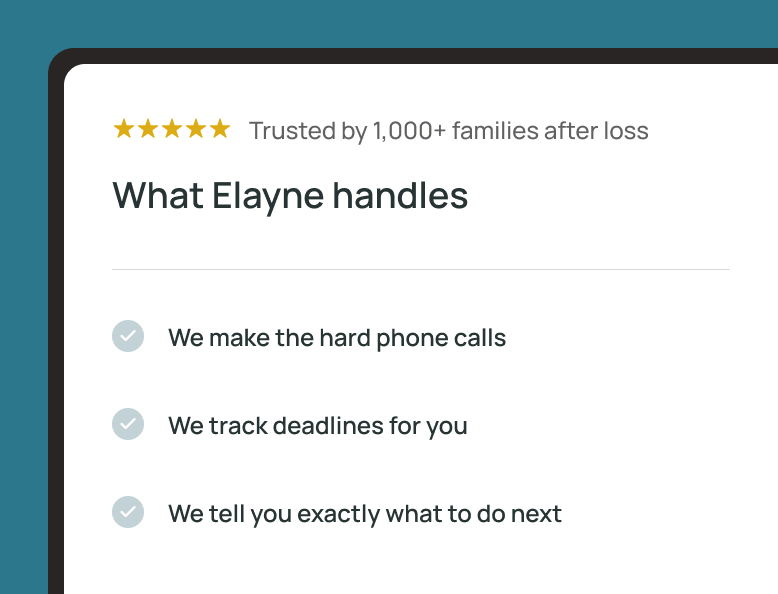Losing a spouse is one of the most devastating and disorienting experiences a person will endure in their lifetime. Along with the deep emotional pain comes a sudden wave of responsibilities—financial, legal, and practical—that demand attention even as you’re trying to process such a tremendous loss. It’s a time when the world seems to stand still, yet life keeps asking more of you.
This guide serves as a supportive and informative starting point for anyone who has recently lost a husband, wife, or partner. It highlights some of the most immediate and important steps to take in the days and weeks that follow, when focus and concentration is most difficult.
{{blog-cta-admin}}
The Immediate Days After Loss
In the first 24 to 72 hours, there are several critical steps you may need to take. It’s okay to ask for help—whether from family, friends, clergy, or legal professionals. You do not have to carry this weight alone.
1. Obtain a Legal Pronouncement of Death
If your spouse passed away in a hospital, care facility, or hospice, the staff will usually handle this for you. If the death occurred at home and wasn’t expected, you’ll need to call 911 so that a medical professional can confirm the death and issue the legal pronouncement. This document is essential for obtaining death certificates and initiating the legal process ahead.
2. Contact Close Family and Friends
Let immediate family members and close friends know what has happened. These early calls can be emotionally difficult, so don’t hesitate to ask someone you trust to make a few of them for you. This early circle of support may also help you begin funeral planning or manage immediate practical concerns.
3. Arrange for the Care of Dependents and Pets
If you and your spouse had children or cared for pets together, it’s important to ensure they are safe and supported in the short term. Depending on your circumstances, you may need to temporarily rely on extended family, close friends, or babysitters for assistance until you can regroup emotionally and logistically.
4. Make Funeral and Burial Arrangements
If your spouse had a pre-planned funeral, follow those instructions. Otherwise, you’ll need to choose a funeral home, decide on burial or cremation, and plan a service. Funeral directors can guide you through the logistics and often help with ordering death certificates as well.
Be sure to check for any written wishes your spouse may have left regarding end-of-life plans. Some preferences may be listed in a will, a living will, or even shared verbally in advance.
5. Secure the Home and Property
It may seem small in the grand scheme of grief, but it’s important to protect your shared property. Lock the home, safeguard valuables, and make sure insurance policies (home, auto, etc.) remain in effect. If your spouse handled most household logistics, you may also need to gather passwords and account information to keep things running.
6. Request Multiple Certified Copies of the Death Certificate
You will need certified copies of the death certificate to handle tasks like closing bank accounts, transferring titles, claiming insurance benefits, and filing taxes. It's a good idea to order 10–12 copies to start. These can be requested through the funeral home or your local vital records office.
7. Locate the Will and Estate Planning Documents
If your spouse left a will or trust, these documents will guide what happens next with their assets and belongings. The will may designate you or someone else as the executor. If no will exists, the estate will go through intestate probate, and local laws will determine how assets are distributed. Consult an estate attorney to help you navigate this process, especially if probate is required.
8. Contact Your Spouse’s Employer (If Applicable)
If your spouse was still employed, notify their HR department. Ask about any final paychecks, unused vacation pay, and whether you’re entitled to continued health benefits, pensions, or life insurance through the employer. If they were retired, notify any pension plans or Social Security.
9. Update Financial Accounts and Legal Documents
In the weeks following your spouse’s death, you’ll need to address a variety of financial matters:
- Notify banks, credit card companies, and loan providers
- Remove your spouse’s name from joint accounts, or close accounts as needed
- Update your own estate plan, power of attorney, and beneficiaries
- Transfer ownership of titles (home, vehicles, etc.)
- Notify the Social Security Administration to stop benefit payments (or start survivors’ benefits)
You may want to work with a financial advisor or estate attorney during this process to ensure nothing gets overlooked.
10. Take Care of Yourself
Grief is not linear. Some days will feel manageable; others may feel crushing. It’s okay to pause the paperwork and simply sit with your loss. Give yourself grace, lean on others, and consider grief counseling or support groups when you're ready. Managing logistics is only one part of moving forward—healing takes time.
{{blog-cta-admin}}
Finding Support and Clarity
In the midst of grief, clarity can be hard to come by. A structured checklist can provide some peace of mind—helping ensure you’ve covered what’s necessary without becoming overwhelmed. Whether you’ve just begun this journey or are weeks into the process, a post-loss checklist can act as your roadmap through uncertain terrain.
We invite you to access Elayne’s Comprehensive Post-Loss Checklist, which includes a detailed timeline and all the legal, financial, and emotional steps involved in managing life after a spouse passes away.
You are not alone. And while the path forward will never be the same as the one before, there is help and guidance at every step.












































